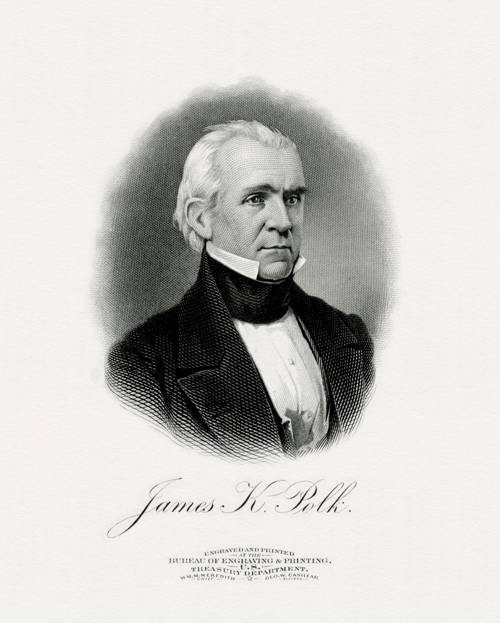
FAQ About James K. Polk

Who was James K. Polk?
James K. Polk was the 11th President of the United States, serving from 1845 to 1849. He is best known for his role in expanding the territory of the United States through events like the Mexican-American War and the acquisition of the Oregon Territory.

What were James K. Polk's major accomplishments as president?
James K. Polk's presidency is noted for its focus on territorial expansion. He successfully negotiated the Oregon Treaty with Great Britain, acquiring the Oregon Territory. Additionally, his administration provoked and won the Mexican-American War, leading to the Treaty of Guadalupe Hidalgo, which significantly expanded U.S. territory by adding present-day California, Nevada, Utah, and parts of several other states.

What was the significance of the Mexican-American War during Polk's presidency?
The Mexican-American War (1846-1848), initiated under Polk's leadership, was significant as it led to the vast expansion of U.S. territory. The Treaty of Guadalupe Hidalgo concluded the war, transferring over 500,000 square miles of land, including present-day California, Arizona, New Mexico, and Texas, from Mexico to the United States.

How did James K. Polk contribute to the Oregon Territory's acquisition?
James K. Polk played a crucial role in acquiring the Oregon Territory through diplomatic negotiations with Great Britain. The Oregon Treaty of 1846 established the 49th parallel as the boundary between British North America and the United States, avoiding a potential conflict and securing land that today constitutes Oregon, Washington, and Idaho.

What was James K. Polk's stance on Manifest Destiny?
James K. Polk was a proponent of Manifest Destiny, the 19th-century doctrine that the United States was destined to expand across the North American continent. His presidency was heavily influenced by this belief, as evidenced by his aggressive territorial expansion policies and accomplishments.

When did James K. Polk serve as President of the United States?
James K. Polk served as the 11th President of the United States from March 4, 1845, to March 4, 1849.

What political party did James K. Polk belong to?
James K. Polk was a member of the Democratic Party. He was known for his strong support of Jacksonian democracy and his expansionist policies.

Did James K. Polk have any significant impacts on domestic policy?
Domestically, James K. Polk's significant impacts included lowering tariffs with the Walker Tariff, reestablishing an Independent Treasury System, and overseeing reforms in the U.S. Navy and Post Office. However, his presidency is most noted for its foreign policy accomplishments rather than domestic policies.

Where was James K. Polk born?
James K. Polk was born on November 2, 1795, in Mecklenburg County, North Carolina.

What was James K. Polk's education background?
James K. Polk attended the University of North Carolina at Chapel Hill, where he graduated with honors in 1818. His education was foundational in his development as a lawyer, politician, and later, a president.

Who was James K. Polk's Vice President?
James K. Polk's Vice President was George M. Dallas, who served as the 11th Vice President of the United States from 1845 to 1849.

How did James K. Polk's presidency end?
James K. Polk's presidency ended on March 4, 1849, when he was succeeded by Zachary Taylor. Polk chose not to seek re-election and retired after serving a single term.

What was James K. Polk's impact on the issue of slavery?
James K. Polk's expansionist policies exacerbated tensions over slavery in the United States. The acquisition of new territories raised the contentious issue of whether these areas should permit slavery, contributing to the nation's sectional conflicts that eventually led to the Civil War.

How long did James K. Polk live after his presidency?
James K. Polk lived only a short time after his presidency, dying on June 15, 1849, just three months after leaving office, due to cholera contracted during a tour of the Southern United States.

What was James K. Polk's approach to the economy?
James K. Polk implemented the Walker Tariff, which lowered tariff rates and was based on revenue rather than protectionist principles. He also reestablished the Independent Treasury System, which separated government finances from private banking and aimed to provide a stable currency system.

What role did Sarah Childress Polk play during James K. Polk's presidency?
Sarah Childress Polk, James K. Polk's wife, played an influential role as First Lady. Known for her intelligence and political acumen, she acted as a close advisor to Polk and hosted many social events, which were crucial in fostering political alliances during Polk's presidency.

Why did James K. Polk only serve one term as president?
James K. Polk pledged during his presidential campaign to serve only one term, aiming to accomplish his ambitious objectives in four years. He fulfilled this promise and chose not to run for re-election in 1848, citing personal and health reasons for his retirement.

What were James K. Polk's views on the U.S. banking system?
James K. Polk distrusted the central banking system and worked to separate government finances from privately owned banks by restoring the Independent Treasury System, effectively revoking the earlier system of national banks managing federal funds.

How did James K. Polk's foreign policy affect the United States?
James K. Polk's foreign policy had long-lasting effects by significantly expanding the nation's size and increasing its geopolitical influence. His successful negotiation for the Oregon Territory and victory in the Mexican-American War paved the way for the United States to emerge as a continental power.

What is James K. Polk's legacy?
James K. Polk's legacy is primarily defined by his successful territorial expansion of the United States, his practicality in achieving defined goals, and his management of complex foreign and domestic issues during his single term. However, his expansionist policies also intensified the national debate over slavery, impacting future conflicts.
